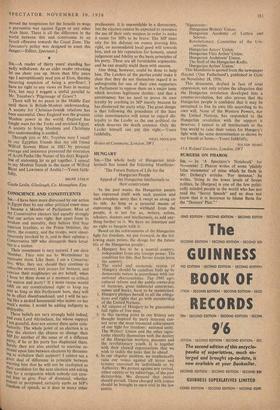SIR,—I have been more distressed by our action in Egypt
than by any other pblitical event since
I became a Member of Parliament. Most of my Conservative electors feel equally strongly that our action was right. But apart from its Wisdom and morality, they believe that four separate loyalties, to the Prime Minister, the Party, the country, and the troops, were simul- taneously invoked by it, and in their opinion a Conservative MP who disregards these loyal- ties is a traitor.
Their resentment is very natural. I am their Member. They sent me to Westminster to represent them. Like them, I am a Conserva- tive. Why, they say, should they continue to subscribe money, knit jerseys for bazaars, and canvass their neighboUrs on my behalf, when have let them down at a moment so critical for nation and party? If I insist (some would add) on my constitutional right to keep my seat as long as this Parliament lasts, they will be in effect disenfranchised, and I will be act- ing like a sacked housemaid who insists on her week's notice. I would be adding indignity to disloyalty. These beliefs are very strongly held indeed, and even Lord Altrincham, for whose support am grateful, does not answer them quite satis- factorily. The whole point of an election is to give the electors the chance to change their MP for another of the same or of a different Party, if he or his party has displeased them. Surely they are also entitled to exercise re- straint upon him between elections by threaten- ing to withdraw their support? I cannot see a great deal of difference in principle between warning him that he will not be readopted as their candidate for the next election and asking him for a resignation which nobody can corn- Pei him to give. Fear of dismissal, whether Instant or postponed, certainly curbs an Mrs freedom of speech, as it does in many other professions. It -is unavoidable in a democracy, but the electors cannot be expected to renounce the use of their only weapon in order to make it easier for MPs to be brave. The MP must rely for his defence on events proving him right, on accumulated local good will towards him, and on his reputation for honesty, sound judgement and fidelity to the basic principles of his party. These are all formidable arguments, and he can usually wield them with success.
One thing, however, could be done to help him. The Leaders of the parties could make it clear that they do not themselves regard it as unforgivable for one of their own supporters in Parliament to oppose them on a major issue which involves legitimate doubts: and that a constituency has no need to prove its own loyalty by crushing its MP merely because he has disobeyed the party whip. The great danger is that following the precedents of the Suez crisis constituencies will come to regard dis- loyalty to the Leader as the one political sin which deserves the death sentence. Only the Leader himself can put this right.—Yours faithfully,
NIGLL NICOLSON


















































 Previous page
Previous page